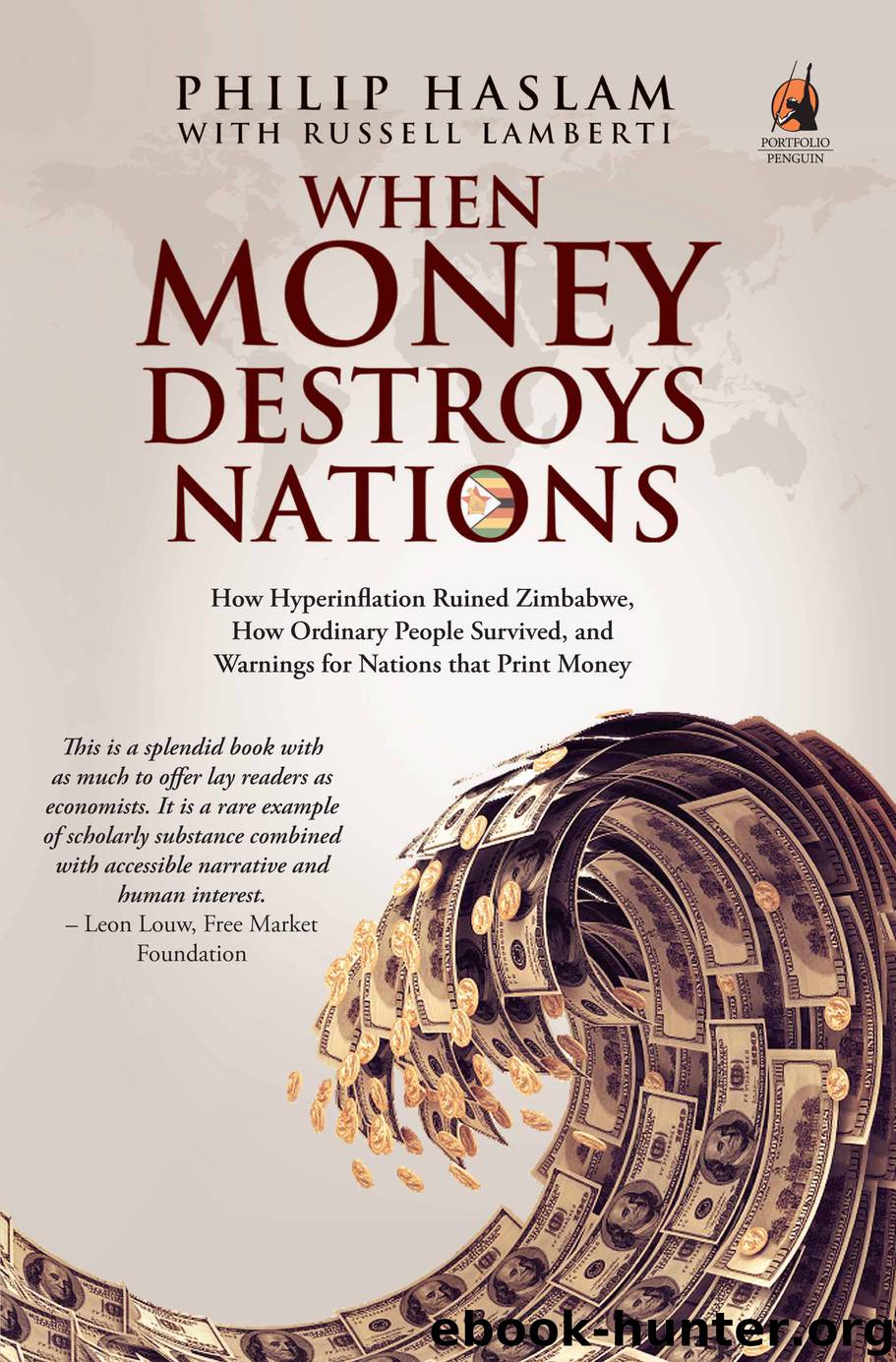When Money Destroys Nations by Philip Haslam

Author:Philip Haslam
Language: eng
Format: epub
ISBN: 978-0-143-53163-0
Publisher: Penguin Random House South Africa
Published: 2015-10-15T04:00:00+00:00
Shortages of ground maize became acute. Known locally as sadza, it is the staple diet of most Zimbabweans. Deprived of staple foods, people in rural areas turned to hunting. Wild game that used to be abundant in the wilderness areas was all but eradicated.
We had both cats and dogs. It was difficult to get ordinary food for us, but next to impossible to find any pet food. We fed the dogs with sadza but the cats wouldn’t touch it. Instead, my husband would shoot pigeons to feed them!
– Counsellor and mother of two
Shopping alternatives
Those who had foreign currency would often ‘pop over the border for their monthly shop’, which became good business for retailers in neighbouring South Africa and Botswana. It was the last source of quality retail goods that most city dwellers had become so accustomed to.
In Woodmead, Johannesburg, a large retail discount store called Makro saw the opportunity and set up an entire section of its store for Zimbabwean shoppers. It was hugely successful, selling Zimbabweans specially stacked pallets of bulk goods. Back in Zimbabwe, this option became so popular that business deals were often quoted in Woodmead Makro Pallets, the equivalent of a standard pallet of goods from the store.
Once goods had been purchased and stacked on a pallet, they needed to be transported. A transport network developed with numerous couriers specialising in moving Makro pallets across the border.
This developed into an online system where Zimbabweans could order directly on the Internet, pay in foreign currency and have delivery made to their houses. However, this option was only available to those who had offshore bank accounts denominated in South African rand.
Bartering
Those who didn’t have access to food from abroad had to source locally from others within their community. Most of this was by barter. Each individual had to become a specialist provider of a particular food or good in his or her community.
Since we had to source food through our relational networks, there was simply no access to luxuries such as soft drinks, chips or other fast food. Sugar was so precious that few people consumed it in unhealthy quantities.
Apart from the politicians who were all tubby, we had few overweight people about.
The only food we could get was locally grown vegetables that were absolutely organic and grown in backyards – no one had money for fertilisers or pesticides; and certainly no one could get expensive genetically engineered seeds.
Download
This site does not store any files on its server. We only index and link to content provided by other sites. Please contact the content providers to delete copyright contents if any and email us, we'll remove relevant links or contents immediately.
International Integration of the Brazilian Economy by Elias C. Grivoyannis(57339)
The Radium Girls by Kate Moore(10910)
Turbulence by E. J. Noyes(7044)
Nudge - Improving Decisions about Health, Wealth, and Happiness by Thaler Sunstein(6636)
The Black Swan by Nassim Nicholas Taleb(6195)
Pioneering Portfolio Management by David F. Swensen(5608)
Rich Dad Poor Dad by Robert T. Kiyosaki(5151)
Zero to One by Peter Thiel(4828)
Man-made Catastrophes and Risk Information Concealment by Dmitry Chernov & Didier Sornette(4740)
Secrecy World by Jake Bernstein(3785)
Millionaire: The Philanderer, Gambler, and Duelist Who Invented Modern Finance by Janet Gleeson(3573)
Skin in the Game by Nassim Nicholas Taleb(3465)
The Age of Surveillance Capitalism by Shoshana Zuboff(3425)
The Money Culture by Michael Lewis(3286)
Skin in the Game: Hidden Asymmetries in Daily Life by Nassim Nicholas Taleb(3267)
Bullshit Jobs by David Graeber(3181)
The Dhandho Investor by Mohnish Pabrai(3170)
The Wisdom of Finance by Mihir Desai(3080)
Blockchain Basics by Daniel Drescher(2893)
